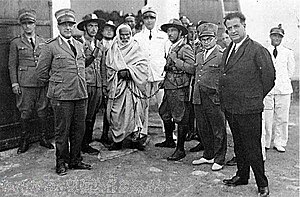Pacification of Libya
| Pacification of Libya | |||||||
|---|---|---|---|---|---|---|---|
| Part of Interwar Period | |||||||
 Cyrenaican rebel leader Omar Mukhtar (the man in robes with a chain on his left arm) after his arrest by Italian armed forces in 1931. Mukhtar was executed in a public hanging shortly afterward. |
|||||||
|
|||||||
| Belligerents | |||||||
|
|
|
||||||
| Commanders and leaders | |||||||
|
|
|
||||||
| Casualties and losses | |||||||
| Over 80,000 Cyrenaicans killed | |||||||
Italian victory
The Pacification of Libya, also known as the Second Italo-Senussi War, was a prolonged conflict in Italian Libya between Italian military forces and indigenous rebels associated with the Senussi Order that lasted from 1923 until 1932, when the principal Senussi leader, Omar Mukhtar, was captured and executed.
The pacification resulted in mass deaths of the indigenous people in Cyrenaica - one quarter of Cyrenaica's population of 225,000 people died during the conflict. Italy committed major war crimes during the conflict; including the use of chemical weapons, episodes of refusing to take prisoners of war and instead executing surrendering combatants, and mass executions of civilians. Italian authorities committed ethnic cleansing by forcibly expelling 100,000 Bedouin Cyrenaicans, half the population of Cyrenaica, from their settlements that were slated to be given to Italian settlers.
In 2008, an agreement of compensation for damages caused by Italian colonial rule was signed between Italy and Libya. Muammar Gaddafi, Libyan ruler at the time, attended the signing ceremony of the document wearing a historical photograph on his uniform that shows Cyrenaican rebel leader Omar Mukhtar in chains after being captured by Italian authorities during the Pacification. At the signing ceremony of the document, Italian Prime Minister Silvio Berlusconi declared: "In this historic document, Italy apologizes for its killing, destruction and repression of the Libyan people during the period of colonial rule." and went on to say that this was a "complete and moral acknowledgement of the damage inflicted on Libya by Italy during the colonial era".
After Italy had conquered Libya from the Ottoman Empire in 1912, the new colony shortly broke out into revolt, with Italian authorities losing control over large regions of the colony. Italy had been in near-constant conflict with the Senussis since Italy seized control of Libya from the Ottoman Empire. Conflict between Italy and the Senussis erupted into major violence during World War I when the Senussis in Libya collaborated with the Ottoman Empire against Italy and raiding into Egypt to attack British forces, to assist Turkish forces attacking the British from the Levant. Warfare between the British versus the Senussis continued until 1917 when the Senussis made peace with the British.
...
Wikipedia
